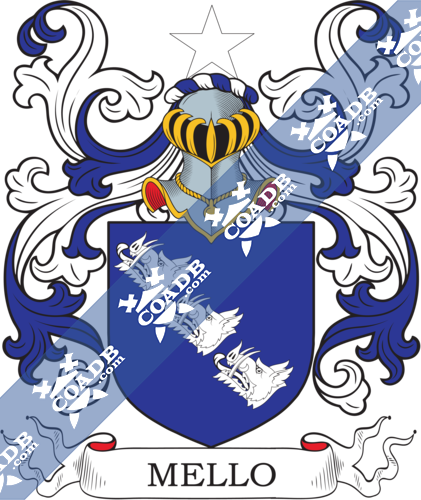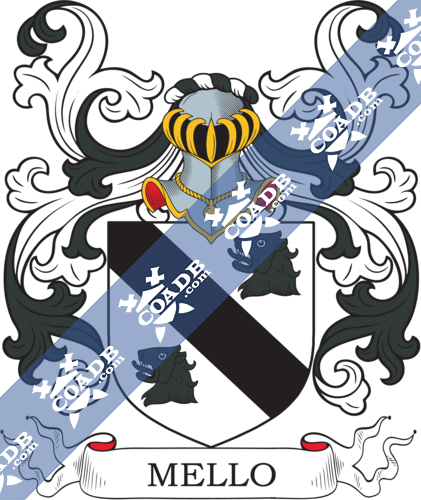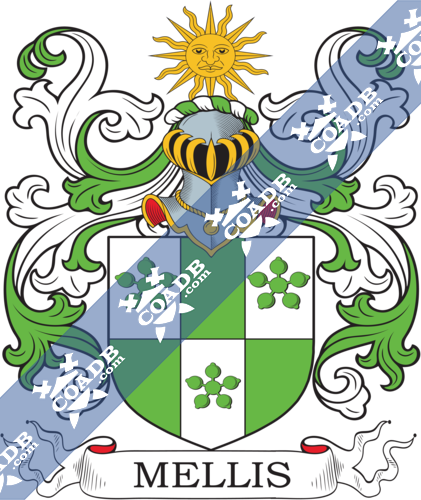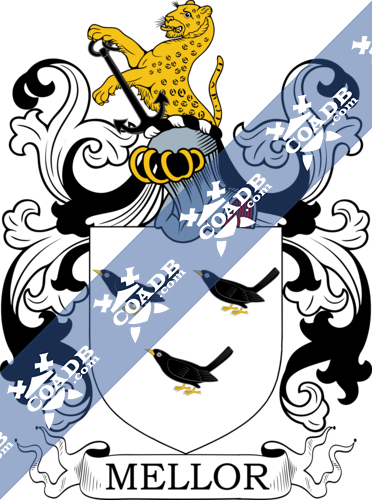Mello Family Crest, Coat of Arms and Name History

Mello Coat of Arms Gallery
Don’t know which Coat of Arms is yours?
We can do a genealogical research. Find out the exact history of your family!
Learn MoreMELLO
Historically, surnames have various sources of origins. In the case of the name Mello, it can be Italian, Dutch, or Belgian in origin. In Italian the term “mello” was usually added as a suffix to a given name. In doing so, it created a nickname of sorts indicating a close, endearing, loving relationship between the two parties. The Dutch or Belgian variation is topographical as it is the name of a place of region called Mellelo which translates to “a wooded area” or “grove”.
Surnames were often created by using an identifying factor about a person such as; a familiar geographical location or a topographical landmark found near the individuals home or birthplace, using one of their parent’s names to create a patriarchal or matriarchal surname, it referenced the person’s occupation, or a defining physical trait among other things. There was almost a limitless source from which surnames could be formed. Once adopted, surnames became hereditary and were passed from one generation to the next.
Surnames in Europe prior to the mid-sixteenth century were largely reserved for the noble class. In the small villages which existed during these earlier times, residents found little need for surnames as everyone in these communities knew each other and a given name would usually suffice. However, as population, growth, and expansions of villages gave way to towns and cities, for practical purposes, it became necessary to add a qualifier to a people’s names to distinguish them, one from another and to make the keeping of tax, census, and immigration records easier. Therefore, the nobles’ practice of surnames gained in popularity.
The task of keeping these records was primarily under the jurisdiction of the Church, local priories, and the government. This was due in large part to the fact that literacy was a skill usually found only among the nobles, the clergy, and government officials and scribes. Even so, there still often existed multiple variations of names which may be attributed to a number of factors. The origins of the surname, the lack of guidelines which existed for spelling, the native language from which the name originated, and the fact that many scribes who were charged with record keeping, spelled phonetically,among other things. Variations of the name may include but are not limited to; Mello; Mellune; Melun; Melunes; Mellun; Melune; Meluns; and Melluns among others.
With the discovery of America and the addition to the British Commonwealth of countries such as Canada, Australia, and New Zealand, it was not long before people began to immigrate to these outlying areas. The use of surnames made tracking of immigrants easier. Some of the first recorded immigrants to America bearing the surname were Angelo Mello who landed and settled in New England in 1893 and Anna Mello who arrived in New York in 1897.
Worldwide, the highest concentration of people with the surname Mello are found in the United States, Australia, Argentina, Italy, Switzerland, and Luxembourg. By state, the largest percentile of those with the surname Mello live in Massachusetts, California, Maine, Nevada, New Hampshire, and Vermont.
There are many persons of note who bear this surname, such as American born biologist and professor, Craig Cameron Mello. Mello attended Brown University, he majored in biochemistry and molecular biology. He received his Sc.B., graduating in 1982. After completing his studies at Brown, Mello attended the University of Colorado, Boulder for his graduate studies in molecular, cellular, and developmental biology. He eventually moved to Harvard where he completed his Ph.D. In 1990. He became a fellow at the Fred Hutchinson Cancer Research Center.
In 1998, in a joint venture between Carnegie Institution for Science and the University of Massachusetts Medical School, Andrew Fire and Craig Mello, along with their colleagues, SiQun Xu, Mary Montgomery, Stephen Kostas, and Sam Driver, headed a research team working concentrating on Ribonucleic Acid (RNA). In 2006, the colleagues published a paper in the journal, Nature, detailing their findings. The director of the Medical Research Council’s Human Genetics Unit, Professor Nick Hastie categorized the paper as revolutionizing the way biological process an regulation was thought about. In 2006, Mellow and Fire along with their colleagues were awarded the Nobel Prize for Physiology or Medicine by Sweden’s Karolinska Institute.
Blazons & Genealogy Notes
1) Az. three boars’ heads erased in bend ar. Crest—A mullet ar.
2) Ar. a bend betw. two lions’ heads erased sa.








